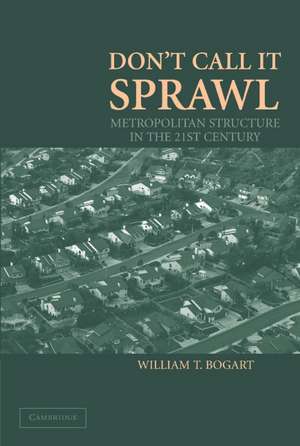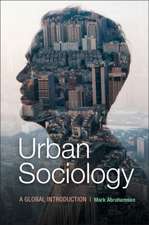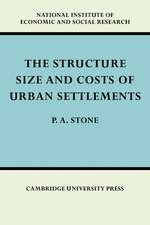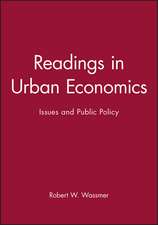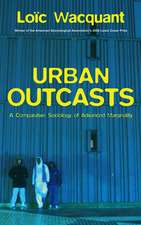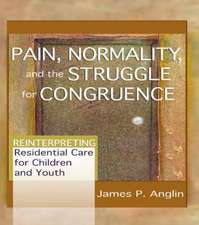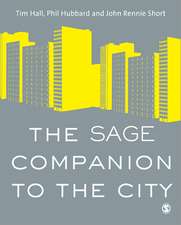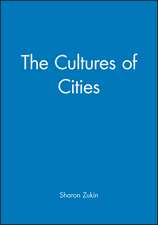Don't Call It Sprawl: Metropolitan Structure in the 21st Century
Autor William T. Bogarten Limba Engleză Paperback – 24 sep 2006
Preț: 258.04 lei
Nou
Puncte Express: 387
Preț estimativ în valută:
49.38€ • 51.49$ • 41.04£
49.38€ • 51.49$ • 41.04£
Carte tipărită la comandă
Livrare economică 21 martie-04 aprilie
Preluare comenzi: 021 569.72.76
Specificații
ISBN-13: 9780521678032
ISBN-10: 052167803X
Pagini: 230
Ilustrații: 16 tables
Dimensiuni: 152 x 228 x 15 mm
Greutate: 0.32 kg
Editura: Cambridge University Press
Colecția Cambridge University Press
Locul publicării:New York, United States
ISBN-10: 052167803X
Pagini: 230
Ilustrații: 16 tables
Dimensiuni: 152 x 228 x 15 mm
Greutate: 0.32 kg
Editura: Cambridge University Press
Colecția Cambridge University Press
Locul publicării:New York, United States
Cuprins
1. The world of today; 2. Making things better: the importance of flexibility; 3. Are we there yet?; 4. Trading places; 5. Downtown: a place to work, a place to visit, a place to live; 6. How zoning matters; 7. Love the density, hate the congestion; 8. Homogeneity and heterogeneity in local government; 9. The world of tomorrow.
Recenzii
Bogart takes the murky and overwrought issue of urban sprawl as his topic and succeeds in producing a literate and insightful book about urban economics. Don't Call It Sprawl is liberally sprinkled with illuminating and sometimes humorous quotations, and Bogart's conversational style is easy to read. Without resort to technical devices, Bogart explains the economic theories and statistical evidence that show why the pejorative view of "sprawl" is rooted in an obsolete view of urban economics. Not content with debunking old theories, Bogart offers a more relevant economic paradigm in which locations within a metropolitan region can be thought of as specialized "trading places," whose functions are constantly changing. Each change in land use is disconcerting to contemporary observers, but the changes are essential to the expanding urban economy. Don't Call It Sprawl does not hide its point of view, but Bogart's respect for his readers' intelligence will make them appreciate his insights even when they disagree with his conclusions." - William Fischel, Dartmouth University
This book places sprawl in a historical context while presenting a unified review of the recent literature on polycentric urban areas. Bogart provides an economist's perspective on urban sprawl that is accessible to students and researchers in other disciplines. - Daniel McMillen, University of Illinois at Chicago
This wonderful book does the seemingly impossible: it brings refreshingly original insights to our understanding of modern cities within an intellectually coherent but empirically relevant unifying framework, and it thoroughly engages the reader throughout. By re-conceptualizing what cities are a complex web of 'trading places' in which households and firms seek to accomplish a variety of goals simultaneously it goes beyond simplistic models that miss the rich set of interactions which cities support and foster, I enthusiastically recommend this book to academics in search of new ideas, to policy makers in search of ways to improve life in modern cities, and to anyone with an interest in understanding where our cities have come from and where they are going. - Thomas J. Nechyba, Duke University
"A leading writer in what has become known as the anti-anti-sprawl literature, Bogart provides strong evidence that what we see as edge-city chaos has in fact a strong logic, and that failure to appreciate the economic, social and demographic cases of sprawl will frustrate any attempt to control or direct it." - Literary Review of Canada
This book places sprawl in a historical context while presenting a unified review of the recent literature on polycentric urban areas. Bogart provides an economist's perspective on urban sprawl that is accessible to students and researchers in other disciplines. - Daniel McMillen, University of Illinois at Chicago
This wonderful book does the seemingly impossible: it brings refreshingly original insights to our understanding of modern cities within an intellectually coherent but empirically relevant unifying framework, and it thoroughly engages the reader throughout. By re-conceptualizing what cities are a complex web of 'trading places' in which households and firms seek to accomplish a variety of goals simultaneously it goes beyond simplistic models that miss the rich set of interactions which cities support and foster, I enthusiastically recommend this book to academics in search of new ideas, to policy makers in search of ways to improve life in modern cities, and to anyone with an interest in understanding where our cities have come from and where they are going. - Thomas J. Nechyba, Duke University
"A leading writer in what has become known as the anti-anti-sprawl literature, Bogart provides strong evidence that what we see as edge-city chaos has in fact a strong logic, and that failure to appreciate the economic, social and demographic cases of sprawl will frustrate any attempt to control or direct it." - Literary Review of Canada
Notă biografică
Descriere
Bogart puts the current policy debate over urban sprawl into a broader analytical context.
